英语句型宝典完整版
英语学习句型宝典完整版

句型宝典■疑问句型What is this?结构︰问句:What+be 动词+this(that…)?答句:This(that…)+be 动词+a book(pen…)。
说明︰此句型意为“这(那)是什么?这(那)是书(钢笔…)”。
what(什么)叫做“疑问词”,用于询问“事物”,通常放在句首,后接be <动词>,再接<主词>,第一个字母w要大写,句尾要加问号(?),位置不可排错。
What is this? This is a chair. 这是什么?这是一张椅子。
What’s this? It’s a book. 这是什么?它是一本书。
What is that? That is a desk. 那是什么?那是一张书桌。
What are these?结构︰问句:What are+these/those…?答句:These/Those are+复数名词(+s/es)。
说明︰<主词>与<动词>的形式要一致,is 后面接单数<名词>,are 后面要接复数<名词>。
What are these? These are books. 这些是什么?这些是书。
What are those? Those are cups. 那些是什么?那些是茶杯。
What are they? They are glasses. 它们是什么?它们是玻璃杯。
What are you?结构︰问句:What+be 动词+主词(人)…?答句:主词+be 动词+a student…。
说明︰此句型意为“你是做什么事情的?我是学生…”。
疑问词what 除了询问事物之外,还可用于询问“人的职业或身分”。
be <动词>随<人称代名词>的变化而改变形态,如:I am,we are,you are,he is…。
What are you? I am a student. 你是做什么事情的?我是一名学生。
李阳英语背诵宝典365

李阳英语背诵宝典3651.Absolutely.(用于答话)是这样;当然是;正是如此;绝对如此。
2.Absolutely impossible!绝对不可能的!3.All I have to do is learn English.我所要做的就是学英语。
4.Are you free tomorrow?你明天有空吗?5.Are you married?你结婚了吗?6.Are you used to the food here?你习惯吃这儿的饭菜吗?7.Be careful.小心/注意。
8.Be my guest.请便/别客气。
9.Better late than never.迟到总比不到好。
10.Better luck next time.祝你下一次好运。
11.Better safe than sorry.小心不出大错。
12.Can I have a day off?我能请一天假吗?13.Can I help?要我帮忙吗?14.Can I take a message?要我传话吗?15.Can I take a rain check?你能改天再请我吗?16.Can I take your order?您要点菜吗?17.Can you give me a wake-up call? 你能打电话叫醒我吗?18.Can you give me some feedback? 你能给我一些建议吗?19.Can you make it?你能来吗?20.Can I have a word with you?我能跟你谈一谈吗?21.Cath me later.过会儿再来找我。
22.Cheer up!高兴起来!振作起来!e in and make yourself at home. 请进,别客气。
24.Could I have the bill,please?请把账单给我好吗?25.Could you drop me off at the airport? 你能载我到飞机场吗?26.Could you speak slower?你能说得慢一点吗?27.Could you take a picture for me? 你能帮我拍照吗?28.Did you enjoy your flight?你的飞行旅途愉快吗?29.Did you have a good day today? 你今天过得好吗?30.Did you have a nice holiday? 你假期过得愉快吗?31.Did you have fun?你玩得开心吗?32.Dinner is on me.晚饭我请客。
新概念2(句型宝典)word版
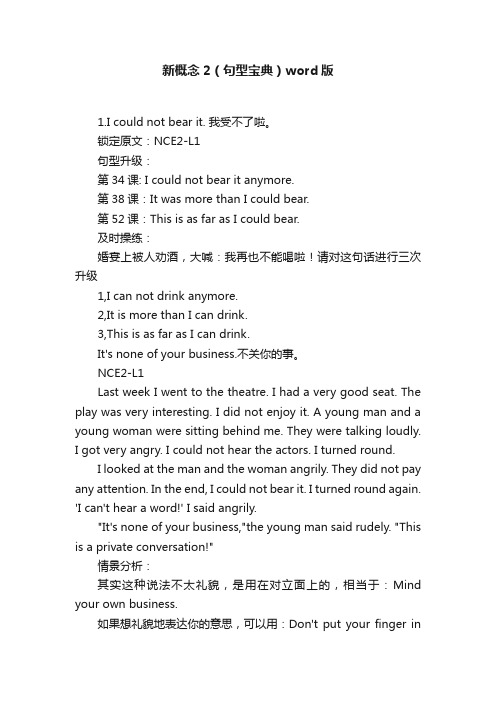
新概念2(句型宝典)word版1.I could not bear it. 我受不了啦。
锁定原文:NCE2-L1句型升级:第34课: I could not bear it anymore.第38课:It was more than I could bear.第52课:This is as far as I could bear.及时操练:婚宴上被人劝酒,大喊:我再也不能喝啦!请对这句话进行三次升级1,I can not drink anymore.2,It is more than I can drink.3,This is as far as I can drink.It's none of your business.不关你的事。
NCE2-L1Last week I went to the theatre. I had a very good seat. The play was very interesting. I did not enjoy it. A young man and a young woman were sitting behind me. They were talking loudly.I got very angry. I could not hear the actors. I turned round.I looked at the man and the woman angrily. They did not pay any attention. In the end, I could not bear it. I turned round again. 'I can't hear a word!' I said angrily."It's none of your business,"the young man said rudely. "This is a private conversation!"情景分析:其实这种说法不太礼貌,是用在对立面上的,相当于:Mind your own business.如果想礼貌地表达你的意思,可以用:Don't put your finger inmy pie.这个句子有调侃的意思,所以不伤人。
句型宝典(完全版)
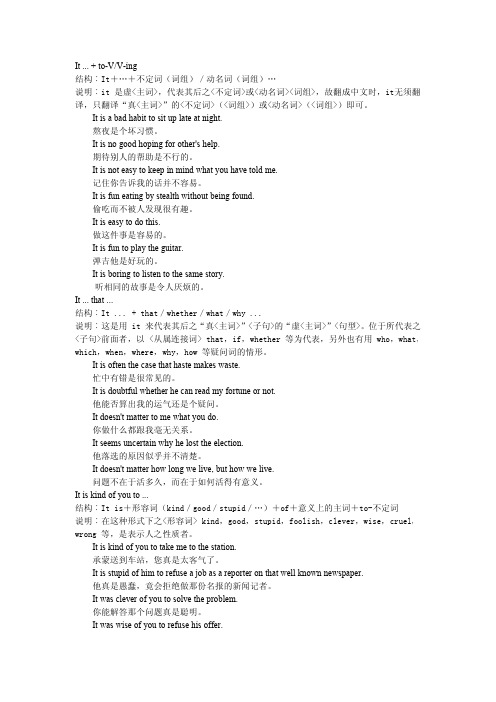
It...+to-V/V-ing结构︰It+…+不定词(词组)/动名词(词组)…说明︰it是虚<主词>,代表其后之<不定词>或<动名词><词组>,故翻成中文时,it无须翻译,只翻译“真<主词>”的<不定词>(<词组>)或<动名词>(<词组>)即可。
It is a bad habit to sit up late at night.熬夜是个坏习惯。
It is no good hoping for other's help.期待别人的帮助是不行的。
It is not easy to keep in mind what you have told me.记住你告诉我的话并不容易。
It is fun eating by stealth without being found.偷吃而不被人发现很有趣。
It is easy to do this.做这件事是容易的。
It is fun to play the guitar.弹吉他是好玩的。
It is boring to listen to the same story.听相同的故事是令人厌烦的。
It...that...结构︰It...+that/whether/what/why...说明︰这是用it来代表其后之“真<主词>”<子句>的“虚<主词>”<句型>。
位于所代表之<子句>前面者,以<从属连接词>that,if,whether等为代表,另外也有用who,what,which,when,where,why,how等疑问词的情形。
It is often the case that haste makes waste.忙中有错是很常见的。
It is doubtful whether he can read my fortune or not.他能否算出我的运气还是个疑问。
中空英语书面表达模板(宝典句型、短语)
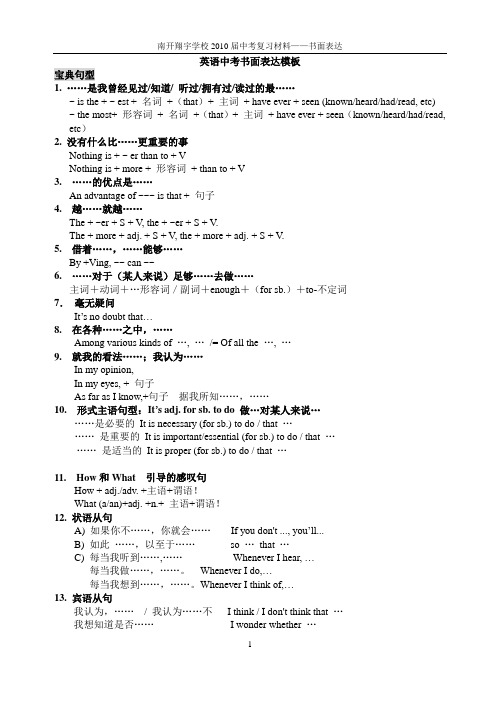
英语中考书面表达模板宝典句型1. ……是我曾经见过/知道/ 听过/拥有过/读过的最……~ is the + ~ est + 名词+(that)+ 主词+ have ever + seen (known/heard/had/read, etc) ~ the most+ 形容词+ 名词+(that)+ 主词+ have ever + seen(known/heard/had/read, etc)2. 没有什么比……更重要的事Nothing is + ~ er than to + VNothing is + more + 形容词+ than to + V3. ……的优点是……An advantage of ~~~ is that + 句子4. 越……就越……The + ~er + S + V, the + ~er + S + V.The + more + adj. + S + V, the + more + adj. + S + V.5. 借着……,……能够……By +Ving, ~~ can ~~6. ……对于(某人来说)足够……去做……主词+动词+…形容词/副词+enough+(for sb.)+to-不定词7.毫无疑问It’s no doubt that…8. 在各种……之中,……Among various kinds of …, …/= Of all the …, …9. 就我的看法……;我认为……In my opinion,In my eyes, + 句子As far as I know,+句子据我所知……,……10. 形式主语句型:It’s adj. for sb. to do 做…对某人来说………是必要的It is necessary (for sb.) to do / that ………是重要的It is important/essential (for sb.) to do / that ………是适当的It is proper (for sb.) to do / that …11. How和What 引导的感叹句How + adj./adv. +主语+谓语!What (a/an)+adj. +n.+ 主语+谓语!12. 状语从句A) 如果你不……,你就会……If you don't ..., you’ll...B) 如此……,以至于……so …that …C) 每当我听到……,……Whenever I hear, …每当我做……,……。
英语的句型句式大全
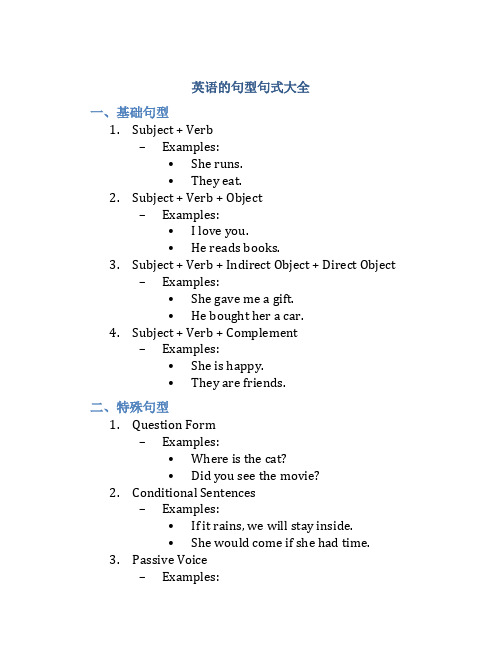
英语的句型句式大全一、基础句型1.Subject + Verb–Examples:•She runs.•They eat.2.Subject + Verb + Object–Examples:•I love you.•He reads books.3.Subject + Verb + Indirect Object + Direct Object–Examples:•She gave me a gift.•He bought her a car.4.Subject + Verb + Complement–Examples:•She is happy.•They are friends.二、特殊句型1.Question Form–Examples:•Where is the cat?•Did you see the movie?2.Conditional Sentences–Examples:•If it rains, we will stay inside.•She would come if she had time.3.Passive Voice–Examples:•The book was written by the author.•The cake was eaten by the children.三、复杂句式1.Relative Clauses–Examples:•The boy who is wearing a red shirt is my brother.•The book that I borrowed from the library is interesting.2.Coordinating Conjunctions–Examples:•I want both the cake and the ice cream.•He is not only smart but also kind.3.Subordinating Conjunctions–Examples:•Although it was raining, we went out.•She will come when she finishes work.四、强调句型1.It is/was + Adjective + that/who + Subject + Verb–Example:•It was Mary who won the competition.2.Subject + Verb + what/who/which + Object + Verb–Example:•I saw what you did.五、形容词和副词的句型1.Adjective + Noun–Examples:•Beautiful flowers•Fast car2.Adverb + Verb–Examples:•Quickly run•Carefully readparative and Superlative Forms–Examples:•He is taller than his brother.•She is the smartest in the class.六、感叹句型1.What + Noun + Subject + Verb!–Example:•What a beautiful day it is!2.How + Adjective/Adverb + Subject + Verb!–Example:•How quickly he runs!以上是英语中常见的句型句式,掌握这些基础句型和特殊句型可以帮助提升英语表达能力,丰富句子结构,让语言更加生动自然。
句型宝典完整版2
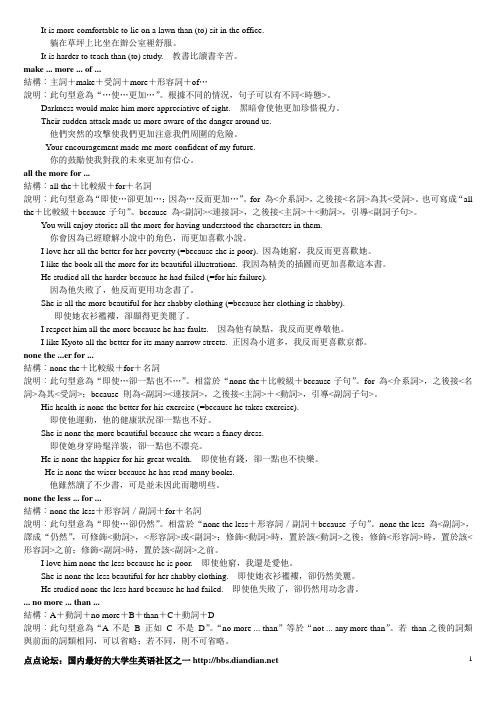
It is more comfortable to lie on a lawn than (to) sit in the office.躺在草坪上比坐在辦公室裡舒服。
It is harder to teach than (to) study. 教書比讀書辛苦。
make ... more ... of ...結構︰主詞+make+受詞+more+形容詞+of…說明︰此句型意為“…使…更加…”。
根據不同的情況,句子可以有不同<時態>。
Darkness would make him more appreciative of sight. 黑暗會使他更加珍惜視力。
Their sudden attack made us more aware of the danger around us.他們突然的攻擊使我們更加注意我們周圍的危險。
Your encouragement made me more confident of my future.你的鼓勵使我對我的未來更加有信心。
all the more for ...結構︰all the+比較級+for+名詞說明︰此句型意為“即使…卻更加…;因為…反而更加…”。
for 為<介系詞>,之後接<名詞>為其<受詞>。
也可寫成“all the+比較級+because-子句”。
because 為<副詞><連接詞>,之後接<主詞>+<動詞>,引導<副詞子句>。
You will enjoy stories all the more for having understood the characters in them.你會因為已經瞭解小說中的角色,而更加喜歡小說。
I love her all the better for her poverty (=because she is poor). 因為她窮,我反而更喜歡她。
英文基本句型

英文基本句型1. I like to eat pizza.2. She is going to the store.3. They have a big house.4. We went to the beach last summer.5. The dog is barking loudly.6. I need to buy some groceries.7. He is playing basketball with his friends.8. The cat is sleeping on the couch.9. She finished her homework early.10. They are having a party next weekend.11. I want to go on vacation.12. The sun is shining brightly.13. I am learning how to cook.14. He is reading a book in the garden.15. She is studying for her exams.16. They are watching a movie at home.17. I can speak Spanish and English.18. He always goes to the gym in the morning.19. She likes to listen to music while she works.20. They are planning a trip to Asia.21. We are going to visit our grandparents next month.22. I need to finish this project by the end of the week.23. The children are playing in the park.24. She has a beautiful singing voice.25. He is always busy with work.26. The flowers in the garden are blooming.27. I have to run some errands this afternoon.28. They are going to have a barbecue in the backyard.29. We are going to have a family dinner tonight.30. She is going to join a dance class.31. I plan to go for a run in the morning.32. He is going to take a cooking class.33. The cat is chasing a mouse in the garden.34. I have to go to the doctor for a check-up.35. They are going to have a picnic in the park.36. We are going to redecorate the living room.37. She is going to paint a picture for her friend.38. I have to organize my closet this weekend.39. He is going to start a new job next month.40. The sun is setting in the horizon.41. I am going to buy a new car soon.42. She is going to adopt a dog from the shelter.43. They are going to renovate their kitchen.44. We are going to plant a vegetable garden in the backyard.45. The children are going to have a sleepover at their friend's house.46. I am going to try a new recipe for dinner.47. He is going to learn how to play the guitar.48. She is going to start a small business.49. They are going to celebrate their anniversary at a fancy restaurant.50. We are going to go on a road trip across the country.51. I am going to take up a new hobby.52. He is going to volunteer at the local charity.53. She is going to write a book about her travels.。
- 1、下载文档前请自行甄别文档内容的完整性,平台不提供额外的编辑、内容补充、找答案等附加服务。
- 2、"仅部分预览"的文档,不可在线预览部分如存在完整性等问题,可反馈申请退款(可完整预览的文档不适用该条件!)。
- 3、如文档侵犯您的权益,请联系客服反馈,我们会尽快为您处理(人工客服工作时间:9:00-18:30)。
句型宝典疑問句型What is this?結構︰問句:What+be 動詞+this(that…)?答句:This(that…)+be 動詞+a book(pen…)。
說明︰此句型意為“這(那)是什麼?這(那)是書(鋼筆…)”。
what(什麼)叫做“疑問詞”,用於詢問“事物”,通常放在句首,後接be <動詞>,再接<主詞>,第一個字母w要大寫,句尾要加問號(?),位置不可排錯。
What is this? This is a chair. 這是什麼?這是一張椅子。
What’s this? It’s a book. 這是什麼?它是一本書。
What is that? That is a desk. 那是什麼?那是一張書桌。
What are these?結構︰問句:What are+these/those…?答句:These/Those are+複數名詞(+s/es)。
說明︰<主詞>與<動詞>的形式要一致,is 後面接單數<名詞>,are 後面要接複數<名詞>。
What are these? These are books. 這些是什麼?這些是書。
What are those? Those are cups. 那些是什麼?那些是茶杯。
What are they? They are glasses. 它們是什麼?它們是玻璃杯。
What are you?結構︰問句:What+be 動詞+主詞(人)…?答句:主詞+be 動詞+a student…。
說明︰此句型意為“你是做什麼事情的?我是學生…”。
疑問詞what 除了詢問事物之外,還可用於詢問“人的職業或身分”。
be <動詞>隨<人稱代名詞>的變化而改變形態,如:I am,we are,you are,he is…。
What are you? I am a student. 你是做什麼事情的?我是一名學生。
What is she? She is a teacher. 她是做什麼事情的?她是一名教師。
Are you a ...?結構︰問句:Be 動詞(am,are,is)+主詞+…?肯定簡答:Y es,主詞+am(are,is)。
否定簡答:No,主詞+am(are,is)not。
說明︰在否定<簡答句>中,<主詞>和am,is,are 可以縮寫;在肯定<簡答句>中則不可。
Is he a student? Y es, he is. (No, he isn’t.) 他是學生嗎?是的,他是。
(不,他不是。
)Are you a teacher? Y es, I am. (No, I’m not.) 你是教師嗎?是的,我是。
(不,我不是。
)Is that a clock? Y es, it is. (No, it isn’t.) 那是鐘錶嗎?是的,它是。
(不,它不是。
)What is your name?結構︰問句:What+is+所有格+name?答句:所有格+name+is+名字。
說明︰“my,your,his,her”為單數人稱的<所有格>;<所有格>後面必接<名詞>,即“<所有格>+<名詞>”;<所有格>不可與a,an,this,that,these 或those 緊接一起使用。
What is your name? My name is Sue. 妳叫什麼名字?我的名字叫蘇。
What is his name? His name is John. 他叫什麼名字?他的名字叫約翰。
What is her name? Her name is Jean. 她叫什麼名字?她的名字叫珍。
Who is that ...?結構︰問句:Who+be 動詞+that+形容詞+名詞?答句:That is+名字。
說明︰Who 是<疑問代名詞>,詢問人的“姓名”或“關係”;將<形容詞>直接放在<名詞>前面,叫做“前位修飾”。
Who is that short boy? That is Bill. 那位矮男孩是誰?那位是比爾。
Who is that tall girl? That is Mary. 那位高女孩是誰?那位是瑪麗。
Who is that fat man? He is my uncle. 那位胖男子是誰?那位是我叔叔。
Where is ...?結構︰問句:Where+be 動詞(am,are,is)+主詞…?答句:主詞+be 動詞+in the+名詞…。
說明︰問句是“Where ...?”,簡答時可用<副詞片語>“In/On the+<名詞>”。
Where is Sue? She is in her room. 蘇在那裡?她在她的房間裡。
Where are your books? On the desk. 你的書在那裡?在書桌上。
Where is your mother? She is in the kitchen. 你媽嗎在哪裡?她在廚房裡。
Are you V-ing ...?結構︰Am(Are,Is)+主詞+現在分詞…?說明︰此句型意為“<主詞>(人,物)正在…嗎?”。
這一<句型>轉換的三要素是:be <動詞>移到句首;改為大寫;句尾用問號。
Is Mary sleeping? 瑪麗正在睡覺嗎?Are you reading a book? 你正在看書嗎?Is the dog playing? 小狗正在玩耍嗎?What are you doing?結構︰問句:What+am(are,is)+主詞+現在分詞?答句:主詞+am(are,is)+現在分詞…。
說明︰“<主詞>(人)正在做什麼?<主詞>(人)正在…”。
注意:<祈使句>的動詞只能用原形,不可造<現在進行式>;表示“瞬間產生”的動作的<動詞片語>,如sit down,stand up,不可造<現在進行式>。
What am I doing? Y ou are reading a book. 我正在做什麼?你正在閱讀一本書。
What are the girls doing? They are singing. 姑娘們正在做什麼?她們在唱歌。
What is Bill writing? He is writing a letter. 比爾在寫什麼?他在寫一封信。
How old are you?結構︰問句:How old+be 動詞+主詞(某人)?答句:主詞(某人)+be 動詞+year(s) old。
說明︰此句型意為“某人幾歲?某人是…歲”。
該句型中,<疑問詞>要用how,不可用what;且be <動詞>(am,is,are)要和後面的<主詞>(某人)配合;答句中的“year(s) old”可以省略。
How old are you? I am twelve (years old). 你幾歲?我十二歲。
How old is your sister? She is thirteen years old. 你的姊妹幾歲?她十三歲。
How old is John? He is one year old. 約翰幾歲?他一歲。
What time is it?結構︰問句:What time is it?答句:It is+數字+o’clock。
說明︰此句型意為“現在是幾點鐘?現在是…點鐘”。
問句中what 當<形容詞>,修飾後面的<名詞> time;time 當時間解時,只能用單數,不可用複數。
What time is it? It is ten o’clock. 現在是幾點鐘?現在是十點鐘。
What time is it? It is six o’clock. 現在是幾點鐘?現在是六點鐘。
What time is it? It is nine o’clock. 現在是幾點鐘?現在是九點鐘。
Do you + V ...?結構︰問句:Do/Does+主詞+原形動詞…?肯定簡答:Y es,主詞+do/does。
否定簡答:No,主詞+don’t/doesn’t。
說明︰肯定句中,如有一般<動詞>(speak,work,teach…),則在句首加<助動詞> do 或does,並將一般<動詞>改為原形<動詞>(不加s或es),即構成<疑問句>。
Do you speak English? Y es, I do. (No, I don’t.)你講英語嗎?是的,我講英語。
(不,我不講英語。
)Does she have a cat? Y es, she does. (No, she doesn’t.)她有一隻貓嗎?是的,她有一隻貓。
(不,她沒有一隻貓。
)Do they work in office? Y es, they do. (No, they don’t.)他們在辦公室裡工作嗎?是的,他們在辦公室裡工作。
(不,他們不在辦公室裡工作。
)What time do you + V ...?結構︰問句:What time+do/does+主詞+原形動詞…?答句:主詞(某人)+一般動詞…+時間。
說明︰此句型意為“某人幾點做某事?”<助動詞> do 或does 的選擇依<主詞>而定,若<主詞>為第三人稱單數,用does;其它用do。
What time do you get up? I usually get up at six. 你幾點起床?我通常六點起床。
What time does he go to bed? He usually goes to bed at ten.他幾點就寢?他通常十點就寢。
What time does your class begin? It begins at eight-ten.你的課幾點開始?八點十分開始。
What day is today?結構︰問句:What day is today?答句:It’s+Sunday/Monday/…。
說明︰此句型意為“今天是星期幾?今天是星期日/星期一/…。
”it 可用於指“星期的名稱”,但this 或that 不可以;一星期七天的名稱,都是<專有名詞>,開頭的首字母要大寫,前面不加<冠詞>。
What day is today? It’s Sunday. 今天是星期幾?今天是星期日。
